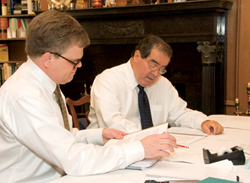A Quote by F. E. Adcock
That typically English characteristic for which there is no English name -esprit de corps.
Quote Topics
Related Quotes
Not long time ago there was a striking example of the extent to which English has diverged: a television company put out a programme filmed in the English city of Newcastle, where the local variety of English is famously divergent and difficult, and the televised version was accompanied by English subtitles!
My father was English. He date-raped my mother so she's hated English men ever since. You know my boyfriend's English, and I'm, uh, I'm half-English, which she's never been real happy about. If she finds out I'm dating someone English, she'll ah, think I' turning my back on her and becoming a foreigner.' Cathy, that's the stupidest reason I've ever heard.
A word about 'plain English.' The phrase certainly shouldn't connote drab and dreary language. Actually, plain English is typically quite interesting to read. It's robust and direct-the opposite of gaudy, pretentious language. You achieve plain English when you use the simplest, most straightforward way of expressing an idea. You can still choose interesting words. But you'll avoid fancy ones that have everyday replacements meaning precisely the same thing.
Malcolm Bradbury made the point, and I don't know whether it's a valid one or not, that the real English at the moment is not the English spoken in England or in America or even in Canada or Australia or New Zealand. The real English is the English which is a second language, so that it's rather like Latin in the days of the Roman Empire when people had their own languages, but had Latin in order to communicate.
You know I don't think there will ever be a time when the English player is not respected, and feared, across the world of football. The English footballer is very brave and strong and committed and there is always enough high-class players in his team to cause concern in any opponent. It is a national characteristic.
Some stories I write in Swedish, some in English. Short stories I've almost exclusively written in English lately, mostly because there's such a small market for them in Sweden and it doesn't really pay either. So, the translation goes both ways. What also factors in is that I have a different voice in English, which means that a straight translation wouldn't be the same as if I'd written it in English originally.
































